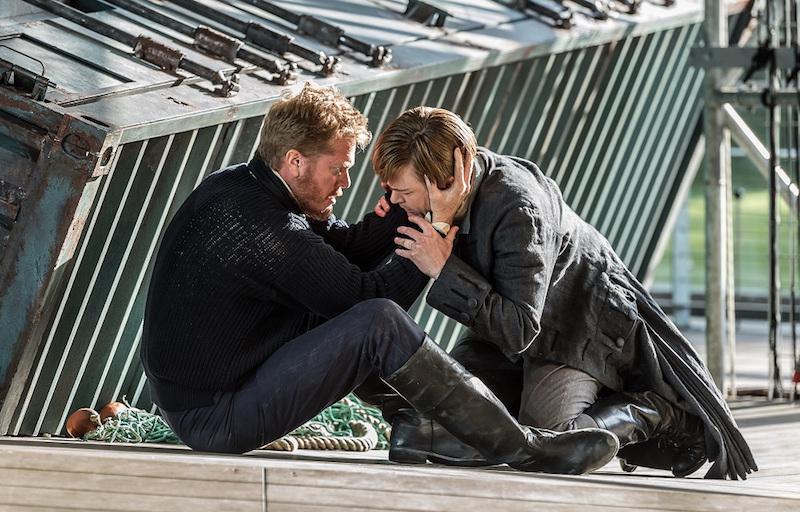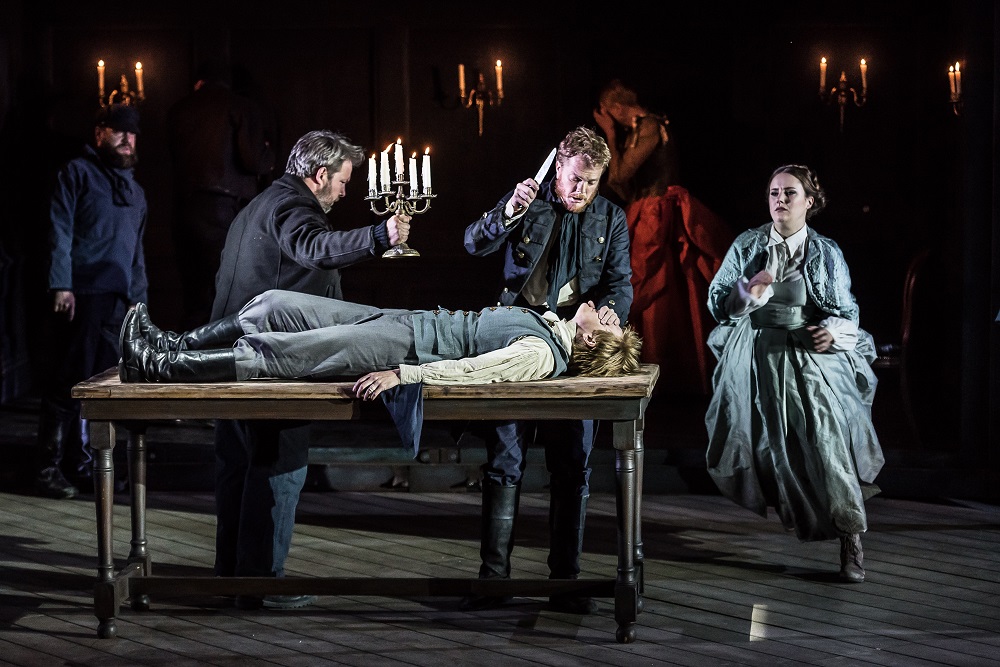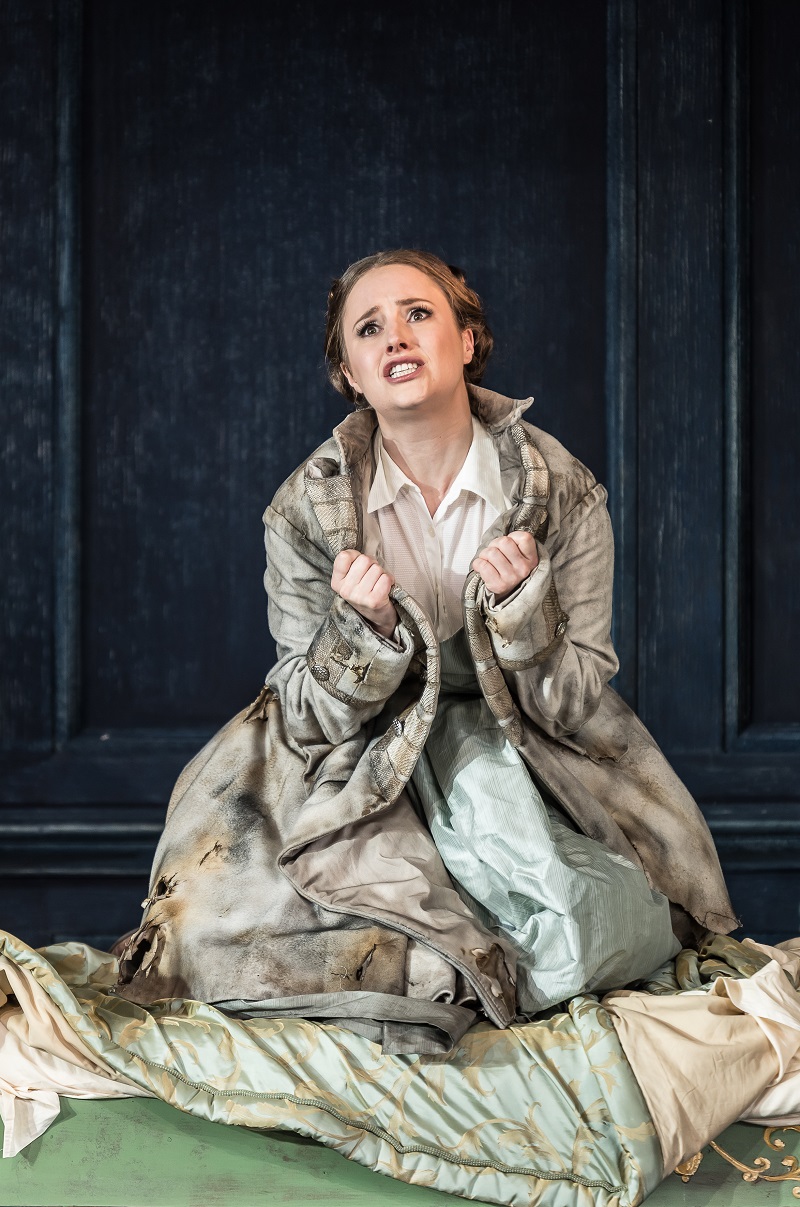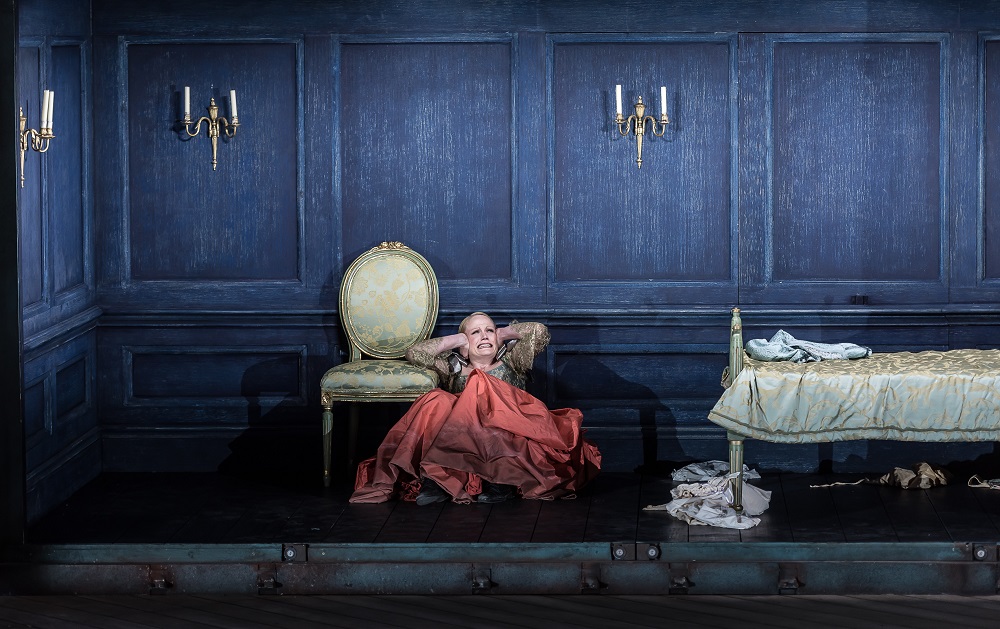Idomeneo, Garsington Opera | reviews, news & interviews
Idomeneo, Garsington Opera
Idomeneo, Garsington Opera
Balance, but never neutrality, from fine singers and director in lacerating Mozart

Natural disaster, in the shape of a metaphorical sea-monster ravaging classical Crete, might make a director's imagination work overtime on Mozart's first, jagged masterpiece. Alas, only unnatural disasters have been inflicted upon us in productions at Glyndebourne, ENO and the Royal Opera, with singers going some way to make amends.
There is orchestral authority, too, from conductor Tobias Ringborg in the very first bars, with dotted rhythms tense and commanding before a swing into a lightning-flash seascape. Some tempi can seem too fast and unyielding for the singers - Elettra's Act One aria especially - and rather romantic changes of gear can seem contrived. There might also be a little more melting pity amid the terror of the third act stretch where King Idomeneo gives in to implacable Neptune and prepares to sacrifice his beloved son Idamante (pictured below).

Ringborg does emphasise the through-composition of the drama, amazing for 1781, but the cuts as we head for unavoidable sacrifice are a mixed blessing. Minor character Arbace (Timothy Robinson in urgent form) gets his vivid recitative but not his arias, the gap where the second should be tumbling us into a crisis - with a third tenor, the luxury casting of Robert Murray in the small role of High Priest - that affects everyone; strings are splendidly severe here. Once divine intervention has averted the crisis, though - and Nicholas Masters was the real bass article as a not-so-distant Voice of Neptune - it's a pity not to have Idomeneo's blissful "Torna la pace", where the action can afford to slacken at last. I dont mind missing the supplementary ballet, which has played a major role in stagings from Schaaf's 26 years ago (the only other good one I've seen) to Kušej's (the worst of Regietheater). Mozart's ballet music is consummate, but it's hard to see how it would fit with the rigour of this particular concept.
We do, though, need the king's final aria as a crowning glory for Toby Spence's magnificently tortured protagonist. A slight forcing in the very early stages of the first act, shared by several of the other singers, gives way to a terrible intensity, and a recognition of long-unseen son Idamante (world-class mezzo Caitlin Hulcup, convincingly boyish), mingled with realisation that the boy must be the sacrifice to Nepture, that's rightly crucial, even if Mozart doesn't give it much space The big set-piece, "Fuor del mar", gets the best deal since the heyday of Anthony Rolfe-Johnson - it was a decorative stretch too far for Philip Langridge, whose natural successor this tenor now turns out to be - and Spence engages both baritonal timbre and true tenorial upper-register ring in it without any obvious gear-changes.
 Interaction is all. Just as we're left in no doubt of the awfulness whereby a son must be sacrificed, we're also plunged right at the beginning into realising what it is for a daughter to have lost her father, as Louise Alder's Trojan princess Ilia (pictured right) outlines forcefully to the man who seems to show a paternal concern for her. She's the fairest of the 18th century protagonists trapped on an alien contemporary shore; Hannah Clark's designs allocate her one of two packing cases as a well-equipped refuge, while out of the second come exhausted Trojans and into it go corpses in body-bags in Act Three, which made my neighbours titter but which seemed to me a perfectly-judged image of the horror. The interior of the crate is neat and clean, a refuge closed to her after the disaster. Maybe there's a bit too much opening and closing of the doors, too much donning of the paternal coat, and later a reverse undress for Idomeneo which doesn't go anywhere, but Albery doesn't err for the most part.
Interaction is all. Just as we're left in no doubt of the awfulness whereby a son must be sacrificed, we're also plunged right at the beginning into realising what it is for a daughter to have lost her father, as Louise Alder's Trojan princess Ilia (pictured right) outlines forcefully to the man who seems to show a paternal concern for her. She's the fairest of the 18th century protagonists trapped on an alien contemporary shore; Hannah Clark's designs allocate her one of two packing cases as a well-equipped refuge, while out of the second come exhausted Trojans and into it go corpses in body-bags in Act Three, which made my neighbours titter but which seemed to me a perfectly-judged image of the horror. The interior of the crate is neat and clean, a refuge closed to her after the disaster. Maybe there's a bit too much opening and closing of the doors, too much donning of the paternal coat, and later a reverse undress for Idomeneo which doesn't go anywhere, but Albery doesn't err for the most part.
Economical but direct in every expressive gesture, radiant in lyric-soprano delivery, Alder - who's already one of the finest singers of the new generation - melts our hearts as she arranges peonies in a vase to match the woodwind's bucolic strains in "Se il padre perdei", where it's subtly suggested that Spence's Idomeneo may have fallen in love with her himself.
Nor is Rebecca von Lipinski's Elettra (pictured below in Act One), lovesick for Ilia's beloved Idamante, a cartoon harpy who veers into kittenishness when she thinks she's getting her heart's desire. Lipinski subtly and even humourously suggests the character's insecurity as well as her vengefulness. If she's too pushed by Ringborg in "Tutti nel cor vi sento", where she turns potential tragedy into being all about her, the Act Two idyll finds this Elettra miraculously transforming into a foolish-fond Mozart heroine of the warmest hue.

The final mad scene gets the works; others on stage feel as much pity for this Elettra's torments as we do. Woodwind contributions, winsomely clear throughout - they're to the front, left of the conductor, in the pit - provide an especially startling contribution in the high oboe that pecks away at Elettra's liver in this number, sounding like an especially demented ring-tone.
Add to the mix the lustrous Hulcup as Idamante, a mezzo Idamante who's already succeeding as Strauss's Octavian around the world, and you're in for the best sung performance of Mozart's first great ensemble, the stricken Act Three Quartet, that may ever have been heard in an opera house: voices are perfectly blended, the action tellingly set across the rift that's opened up in the wooden stage since the devastation. Crowning it all is the young and shattering chorus, superbly trained by the excellent Susanna Stranders, contributing in a way that their counterparts at ENO won't get to do in their entire 2016-17 season (and you have to ask why ENO isn't using British-based singers anything like as extensively as they do here). Meanwhile, in the last three or four years Garsington has reached the standards of Glyndebourne at its best, and there's no higher compliment than that.
rating
Explore topics
Share this article
The future of Arts Journalism
You can stop theartsdesk.com closing!
We urgently need financing to survive. Our fundraising drive has thus far raised £49,000 but we need to reach £100,000 or we will be forced to close. Please contribute here: https://gofund.me/c3f6033d
And if you can forward this information to anyone who might assist, we’d be grateful.

Subscribe to theartsdesk.com
Thank you for continuing to read our work on theartsdesk.com. For unlimited access to every article in its entirety, including our archive of more than 15,000 pieces, we're asking for £5 per month or £40 per year. We feel it's a very good deal, and hope you do too.
To take a subscription now simply click here.
And if you're looking for that extra gift for a friend or family member, why not treat them to a theartsdesk.com gift subscription?
more Opera
 The Makropulos Case, Royal Opera - pointless feminist complications
Katie Mitchell sucks the strangeness from Janáček’s clash of legalese and eternal life
The Makropulos Case, Royal Opera - pointless feminist complications
Katie Mitchell sucks the strangeness from Janáček’s clash of legalese and eternal life
 First Person: Kerem Hasan on the transformative experience of conducting Jake Heggie's 'Dead Man Walking'
English National Opera's production of a 21st century milestone has been a tough journey
First Person: Kerem Hasan on the transformative experience of conducting Jake Heggie's 'Dead Man Walking'
English National Opera's production of a 21st century milestone has been a tough journey
 Madama Butterfly, Irish National Opera review - visual and vocal wings, earthbound soul
Celine Byrne sings gorgeously but doesn’t round out a great operatic character study
Madama Butterfly, Irish National Opera review - visual and vocal wings, earthbound soul
Celine Byrne sings gorgeously but doesn’t round out a great operatic character study
 theartsdesk at Wexford Festival Opera 2025 - two strong productions, mostly fine casting, and a star is born
Four operas and an outstanding lunchtime recital in two days
theartsdesk at Wexford Festival Opera 2025 - two strong productions, mostly fine casting, and a star is born
Four operas and an outstanding lunchtime recital in two days
 The Railway Children, Glyndebourne review - right train, wrong station
Talent-loaded Mark-Anthony Turnage opera excursion heads down a mistaken track
The Railway Children, Glyndebourne review - right train, wrong station
Talent-loaded Mark-Anthony Turnage opera excursion heads down a mistaken track
 La bohème, Opera North review - still young at 32
Love and separation, ecstasy and heartbreak, in masterfully updated Puccini
La bohème, Opera North review - still young at 32
Love and separation, ecstasy and heartbreak, in masterfully updated Puccini
 Albert Herring, English National Opera review - a great comedy with depths fully realised
Britten’s delight was never made for the Coliseum, but it works on its first outing there
Albert Herring, English National Opera review - a great comedy with depths fully realised
Britten’s delight was never made for the Coliseum, but it works on its first outing there
 Carmen, English National Opera review - not quite dangerous
Hopes for Niamh O’Sullivan only partly fulfilled, though much good singing throughout
Carmen, English National Opera review - not quite dangerous
Hopes for Niamh O’Sullivan only partly fulfilled, though much good singing throughout
 Giustino, Linbury Theatre review - a stylish account of a slight opera
Gods, mortals and monsters do battle in Handel's charming drama
Giustino, Linbury Theatre review - a stylish account of a slight opera
Gods, mortals and monsters do battle in Handel's charming drama
 Susanna, Opera North review - hybrid staging of a Handel oratorio
Dance and signing complement outstanding singing in a story of virtue rewarded
Susanna, Opera North review - hybrid staging of a Handel oratorio
Dance and signing complement outstanding singing in a story of virtue rewarded
 Ariodante, Opéra Garnier, Paris review - a blast of Baroque beauty
A near-perfect night at the opera
Ariodante, Opéra Garnier, Paris review - a blast of Baroque beauty
A near-perfect night at the opera
 Cinderella/La Cenerentola, English National Opera review - the truth behind the tinsel
Appealing performances cut through hyperactive stagecraft
Cinderella/La Cenerentola, English National Opera review - the truth behind the tinsel
Appealing performances cut through hyperactive stagecraft

Add comment